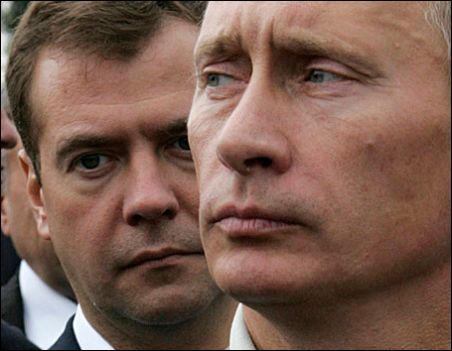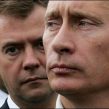
Putin and Medvedev Stage Contrasting Political Shows
Publication: Eurasia Daily Monitor Volume: 7 Issue: 163
By:

Two high-profile international events occurred in Russia last week: on Monday, Prime Minister Vladimir Putin, held a traditional meeting with the Valdai club; and on Friday, President Dmitry Medvedev participated in the Yaroslavl forum, which is designed to become a new tradition. Some Western participants were given a chance to compare the roundtables, but Putin clearly favors think-tankers like Fiona Hill or Samuel Charap, while Medvedev invited such renowned sociologists as Immanuel Wallerstein and Craig Calhoun. Even more telling is the difference in the list of Russian participants: the Valdai club is run by traditionalists like Sergei Karaganov and Vyacheslav Nikonov, while Vladislav Surkov, deputy head of the presidential administration who supervises the Yaroslavl event, granted favors to his protégées, Gleb Pavlovsky and Valery Fadeev, and also allowed for some critical views from Igor Yurgens and Vladislav Inozemtsev. It is also characteristic that all Medvedev’s answers were immediately published on the presidential website, while Putin preferred off-the-record discussions, so only select quotes appeared in the media (RIA Novosti, September 6).
The difference in the content of the two carefully staged shows was also quite pronounced. Putin’s message was unequivocally about stability: asserting Russia’s recovery from the crisis he focused particularly on the energy sector praising Gazprom’s performance and bragging about the South Stream pipeline project (Rossiyskaya Gazeta, September 8). He expressed a very positive attitude towards US President, Barack Obama, and refrained from communicating the doubts in his ability to translate the sincere commitment to the “reset” in Russia-US relations into practical deeds that he had spelled out one week earlier in a remarkably candid interview with Andrei Kolesnikov (Kommersant, August 30). As for the brutal suppression of opposition rallies, Putin insisted on the legitimacy of treating these “provocations” with necessary force. The question that clearly irked him was about Mikhail Khodorkovsky, who according to Putin “has blood on his hands” and would await the court’s verdict (Vedomosti, September 7; Novaya Gazeta, September 10).
Medvedev predictably stayed on the message of “modernization” and tried to reaffirm the ambitions declared a year ago in his “Go, Russia!” article (RIA Novosti, September 10). Medvedev was very circumspect in admitting shortcomings in Russian democracy, referring to the lack of tradition and difficult heritage of the 1990’s but elaborated at length about the virtues of personal liberty and responsibility. In Medvedev’s opinion, the atmosphere in society is neither heavy nor stale and it is “absolutely normal” that some people are “actively protesting” against particular causes; what aroused his enthusiasm was the role of the Internet in transforming the very nature of democracy (Kommersant, September 11). Medvedev did not miss a chance to recycle his favorite proposal for upgrading the European security architecture with a new treaty and ventured a supposition that the US administration is “jealous” about this initiative.
One distinct impression from these PR exercises is that two electoral campaigns are gearing up with one candidate showing eagerness to lead the process of change and another –conveying his readiness to rule the country with no change (Ekho Moskvy, September 10). In reality, however, it is too early to engage in campaigning and both pretenders firmly deny that they could possibly run against one another. At the same time, both have implicitly but transparently indicated their intention to claim the top position: Putin dismissed the question about possible damage to democracy from his third term and invoked the example of former US President, Franklin Roosevelt, while Medvedev’s press-secretary confirmed that his modernization plan was aimed beyond one presidential term. This quasi-competition takes caricature forms as Medvedev plans to travel to Ukraine by car after Putin’s much-advertised (and ridiculed on the Internet) rally in the Far East (www.newsru.com, September 8).
Typically, neither of the co-rulers shows much interest in focusing his proto-campaign on the real issues that the country is facing, first of all on the exhaustion of the economic recovery. The promises of new money from the federal budget are generous despite the yawning deficit, but the plain fact remains that in the first half of 2010, no increase in investments in fixed assets was registered compared with the very low base of 2009, and foreign direct investment declined by 11 percent, while Russian investments abroad jumped by 17.5 percent (www.gazeta.ru, September 8). Medvedev tries to keep food prices under his personal control, insisting that despite the extremely hot summer there are no “objective reasons” for a 50 percent price jump on bread and eggs and blaming profiteering traders. Greed is certainly a factor, but there is no way around the simple economic logic that a steady expansion of money supply during slack economic growth drives up inflation, therefore the 9 percent annual figure now looks like a conservative estimate (Vedomosti, September 9).
Medvedev’s longing to portray himself as a decisive and tough leader looks truly pathetic because the limits of his decision-making authority are too obvious even for the general public. His self-promotion is not, however, aimed at the electorate, which would not be given much say in selecting the boss of bosses, but at the elites, in whose ranks he is desperately trying to find modernizers appealing implicitly to their self-preservation instinct. He has grown wary of antagonizing the undecided by lashing out against corruption, so his PR exercise in Yaroslavl was about moderating rather than advancing the modernization campaign launched in the year-old article (www.slon.ru, September 10).
Putin’s clear intention to cast himself again as the “national leader” reusing the political “technologies” exploited in the fall of 2007, may be welcomed by large segments of the bureaucracy irritated by the ambivalences of the duumvirate (Ezhednevny Zhurnal, September 10). His rather unexciting meeting with the Valdai veterans was quite probably intended to send a signal to Western policymakers that his re-enthronement was scheduled and had to be accepted as a fact of political life (Nezavisimaya Gazeta, September 8). The hints from a few experts that his methods of “manual management” are seriously inadequate are obviously not penetrating his overgrown self-esteem. Putin appears firmly set to step into the same river twice –but could discover that he is instead sinking deeper into a familiar quagmire.




